The wait is almost over and the tenth Rugby World Cup kicks off this evening with the blockbuster clash of France and New Zealand.
It's only been four years since South Africa lifted the Webb Ellis Cup in Japan but, in a cycle that included a global pandemic, it seems a lifetime ago.
Giddy anticipation as the tournament nears may lend itself to exaggeration but there is a general feeling that this renewal will top anything that has gone before.
So many intriguing narratives abound.
Can hosts France, three-time beaten finalists, deal with the pressure and fulfil their destiny? They are a team built to win the World Cup.
What say New Zealand? The three-time winners are not the force of old but they don’t travel to make up numbers.
The champion Springboks are considered in better nick than when they beat England four years ago in Yokohama. Only a fool would write them off.
Considered better prepared and in a run of form never matched, can Ireland break that lowest of glass ceilings and make it out of a quarter-final? Could they win the damned thing?
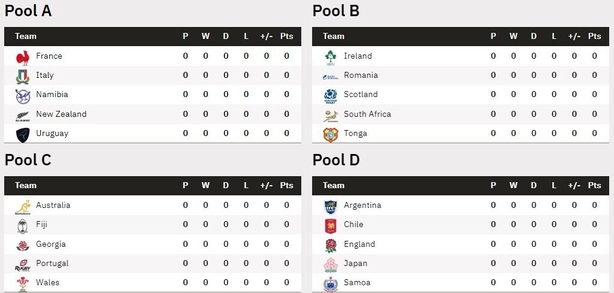
Add into the mix a lopsided draw – made in 2020 to give World Rugby a head start in planning, ticketing and promotion as it comes up against the 2024 Paris Olympic Games – that hardly appears fair with five of the top ranked nations on one side.
Huge jeopardy lies within some of the group games, specifically Ireland’s Pool B, while Fiji will fancy their chance in Pool C, where Wales and Australia have spluttered into France.
England look rudderless and down in spirit, and Argentina – always extra hyped for the World Cup - will smell blood.
Will we see card chaos? Bar Ireland, the rest of the contenders appear to pay little attention to World Rugby’s latest clampdown on dangerous play. It’s going to cost someone in a big match soon.
Forty-eight matches over 51 days will tell the tale.
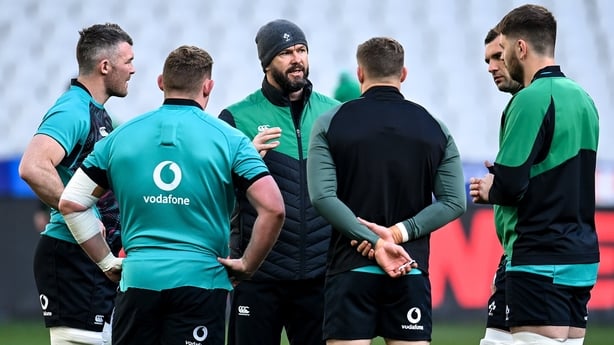
Four-year cycles were not traditionally part of the Irish rugby lexicon, Six Nations seemingly the be all and end all, but by design of Andy Farrell, this squad has done a lot of heavy lifting since 2019.
A series win in New Zealand, victories over the World Cup winners and the World Cup hosts, all crowned with Grand Slam silverware. Untested this team is not.
It’s testimony to the quality of the top-tier nations that Farrell’s men – on a record 13-game winning streak – go into the tournament as fourth favourites.
Ranked number one in the world, they have made no secret that their aim is to win the World Cup.
It’s the All Blacks, last seen on the end of the record 35-7 hammering at the hands of South Africa, who are the favourites.
World Cup openers have traditionally featured the hosts against a group hopeful but organisers have this time decided to front-load Pool A with the most mouthwatering of match-ups.
Les Bleus against All Blacks to decide who tops the pool, with no disrespect to Italy, Namibia or Uruguay.
The hosts have been building for this tournament since winning the bid back in 2017 (Ireland had also put in to become first-time hosts but infamously didn't feature in the final calculations).
Head coach Fabien Galthie, who took over in 2020, has cut the figure of man on a mission ever since.
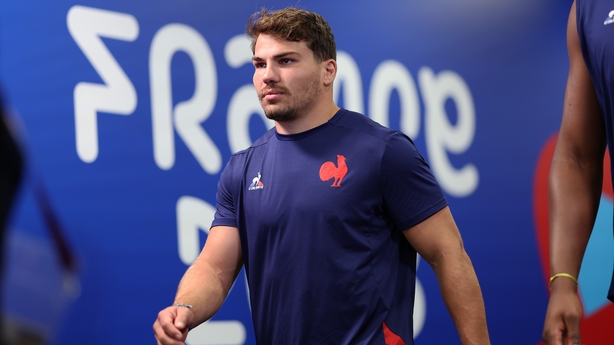
They are a team built around the many talents of scrum-half Antoine Dupont, who has been the Six Nations Player of the Championship three times since 2020 and the World Rugby Player of the Year in 2021.
The 26-year-old will win his 50th cap against New Zealand.
Runners-up in 1987, 1999 and 2011, the big question now is if France can handle the pressure and expectations of a home World Cup?
They last hosted the tournament in 2007, where they lost to Argentina in the group stage and then beat New Zealand in the quarter-final before bowing out to England.
Including a Grand Slam in 2022, their preparations have been close to perfect, until recently.
The last two November windows saw them claim victories over New Zealand, Australia, Argentina and South Africa, all the time confidence and cohesion visibly growing in a squad containing back-to-back Champions Cup winners in La Rochelle’s Uini Atonio, Pierre Bourgarit, Gregory Alldritt, Paul Boudehent and Jonathan Danty, and Toulouse stars Julien Marchand, Cyril Baille, François Cros, Thomas Ramos and Dupont.
Bordeaux’s Damian Penaud is among the favourites to be the top try-scorer in the tournament.
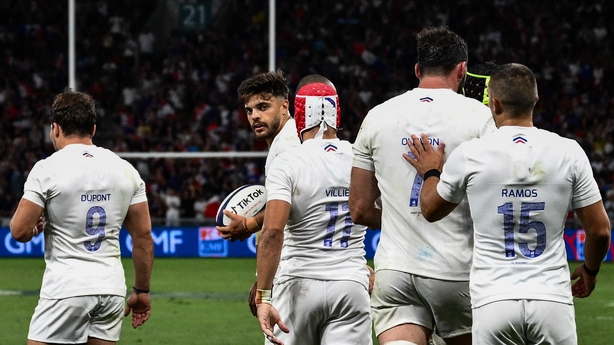
Formidable as the squad is, the World Cup warm-up schedule has taken a toll and they lost star out-half Romain Ntamack, lock Paul Willemse and, for the opening games at least, centre Danty and prop Baille will sit out.
Willemse’s replacement Bastien Chalureau has been the subject of some controversy in France. The Montpellier lock has a conviction, which he is appealing, for a racially-motivated attack and in May Mohamed Haouas, then also with Montpellier, was sentenced to one year in prison for alleged domestic violence, and subsequently jettisoned from consideration.
There is naturally growing expectation from within France about the team’s prospects and how they get off the mark against New Zealand will set a tone.
Few will be surprised if they make it fourth time lucky in a final.
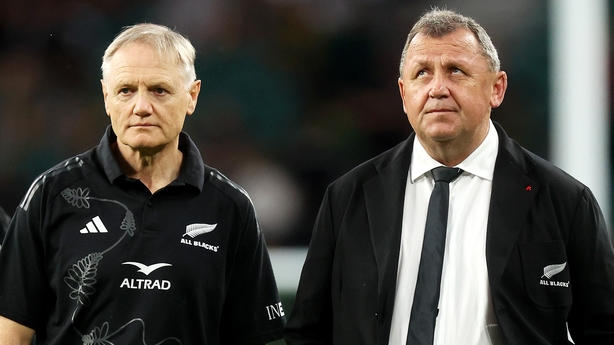
Ian Foster’s New Zealand will have a thing or two to say about that but the stark reality is that this outfit are not the same threat they were ahead of the last three World Cups, during which they went on a record 18-game winning run that came to an end in the semi-final against England four years ago.
Since the last World Cup, their clubs have lost the Jaguares and the South African franchises from Super Rugby, while Covid-19 restrictions also meant the loss of Australian rivals for the 2020 and 2021 editions.
Within that timeframe, they lost to the Pumas twice and Ireland, in 2022, became the first side to win a series in New Zealand since France in 1994.
Former Ireland head coach Joe Schmidt joined the backroom staff in 2021 and Webb Ellis winners Dane Coles, Brodie Retallick, Sam Whitelock, Aaron Smith and Beauden Barrett are still around.
They claimed the shortened Rugby Championship title in the summer but are, in the eyes of most observers, mere mortals these days, to the point that given a choice between meeting the All Blacks or France in a possible quarter-final, it’s the Kiwis who would be preferable.
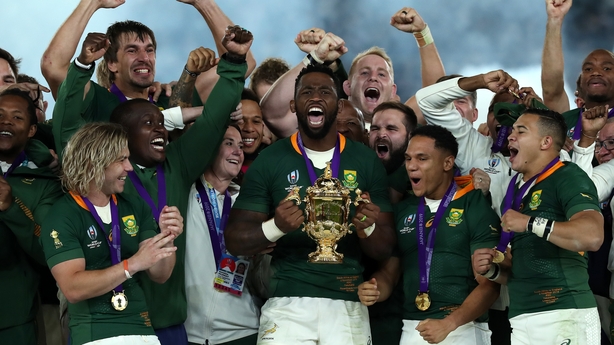
Holders South Africa are considered a stronger outfit than they were prior to Japan, when they became the first side to lose a pool match (to New Zealand) and go on to lift the trophy.
They look more powerful and, now in their sixth year under Rassie Erasmus and Jacques Nienaber, more settled, however the loss of experienced out-half Handre Pollard, for the opening stanzas at least, can’t but have an impact. Manie Libbock, the only specialist 10, has nine caps to his name.
While the sum of their parts is massive – just witness the 7:1 bench split used as Erasmus unleashed Bomb Squad 2.0 against New Zealand – the Springboks always seem to bring something extra in determination, bone-crunching practicality and rugby nous when it comes to the World Cup.
The meeting with Ireland in round four may have extra spice should Munster man Jean Kleyn, winner of five Irish caps in 2019, make the squad while team-mate RG Snyman is likely to be involved in some capacity. Centre Damian de Allende, formerly of the red parish, is also in the mix.
The squad actually has the oldest average age profile, coming in a 30.4 (Ireland next on the contenders list at 29.4; New Zealand 28.3; France 27.4)
While that fixture would usually be a pool decider, it’s possible that nothing will be decided until two weeks later when Ireland take on Scotland in the last round.
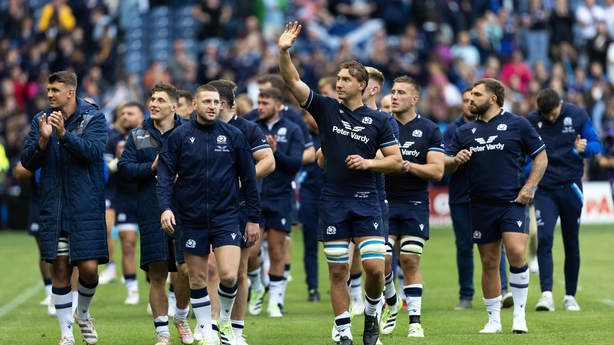
Gregor Townsend’s side might have risen to five in the rankings but still come in under the radar. The boss man now has Finn Russell playing like a Test match out-half and if he continues his recent form will be a danger to both Ireland and South Africa. Former Ireland Under-20 out-half Ben Healy is Russell’s likely back-up and wouldn’t it be just typical if he had something to contribute to the affair.
The warm-ups may, for the most part, be taken with two large fistfuls of salt but they turned over an experimental French outfit and were denied a draw against the first team by a late Ramos kick.
The other half of the draw, while short of current on-form teams, promises intrigue.
In Pool C, Wales, under Warren Gatland, have gone without many of the older cohort, a nod perhaps that they know this is a tournament too far and that blooding younger players is the best option.
A run of 13 games with just three wins sets them up nicely for a battle with Eddie Jones’ Australia, Webb Ellis winners in 1991 and 1999.
The abrasive Aussie, sacked by England in December, has overseen five defeats from five matches in charge and has dropped captain Michael Hooper and Quade Cooper.
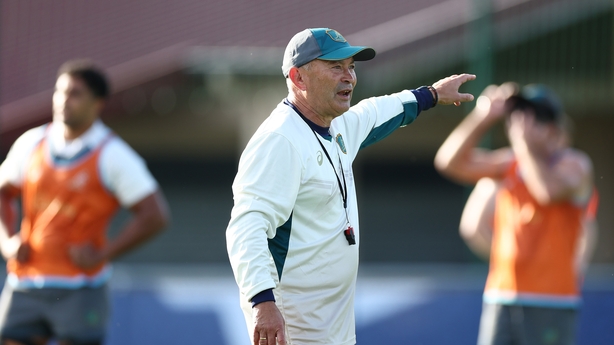
Just eight of the squad have World Cup experience, while Jones is placing his faith in novice out-half Carter Gordon. Winger Mark Nawaqanitawase is one to watch, while lock Will Skelton needs to find his La Rochelle game-influence.
Portugal make their second appearance at the World Cup finals (also 2007) and will make up the numbers but it’s Georgia, Rugby Europe champions and who beat Wales in November, and the flying Fijians, who will aim to shake up the predictions.
Fresh from a fully-deserved win over England at Twickenham, Fiji will target a top-two spot but the loss of out-half Caleb Muntz to injury curtails their chances.
Steve Borthwick’s England, winners in 2003 and beaten finalists in 2007 and 2019, are in a right state at the moment.
Since winning the Six Nations in 2020, they’ve won just two games per championship over the last three seasons.
There are few signs of progress with some solace in the probability that they can’t get any worse.
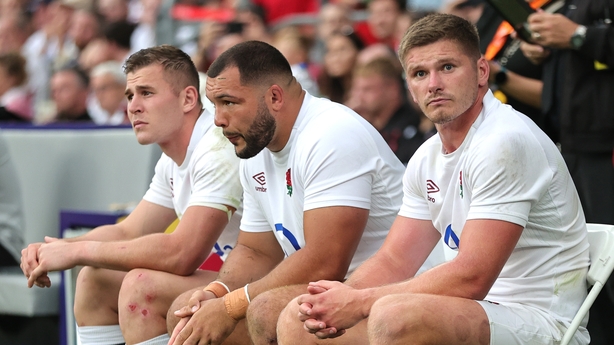
Their discipline has been a huge issue – Owen Farrell and Billy Vunipola miss the crucial opener against Argentina on Saturday – and they are unsure of their gameplan.
With a declining Japan, Samoa and Chile in their group, the Red Rose luck is in and they could even fall into a semi-final, given the draw.
The bunker review system will be used at the tournament for the first time, while World Rugby’s latest lessons on head contact prevention refuse to be learned by many.
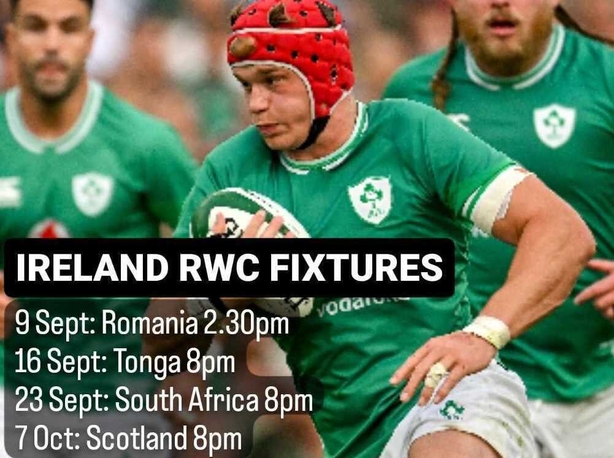
Ireland’s superb disciplinary record and rise to the top are no coincidence.
Farrell identified early the benefits of keeping 15 men on the field and in the last 24 games the team have had just two players on the naughty step (James Ryan and Andrew Porter in the New Zealand series).
Those two represent just over 1% of cards given to Six Nations and Rugby Championship sides since the summer of 2021, according to my colleague Neil Treacy’s records.
For comparison, the Wallabies, ranked ninth in the world, have been eating up cards like Smarties, 29 yellow and two reds.
It’s set up perfectly for a memorable tournament. The talk is over, let the games begin.
We need your consent to load this rte-player contentWe use rte-player to manage extra content that can set cookies on your device and collect data about your activity. Please review their details and accept them to load the content.Manage Preferences
Listen to live coverage of Ireland v Romania (Saturday 2.30pm) on RTÉ Radio 1, and follow live updates of that game, France v New Zealand (Friday 8.15pm) and South Africa v Scotland (Sunday 4.45pm) on RTÉ Sport Online and the RTÉ News app, with match reports on every game.








